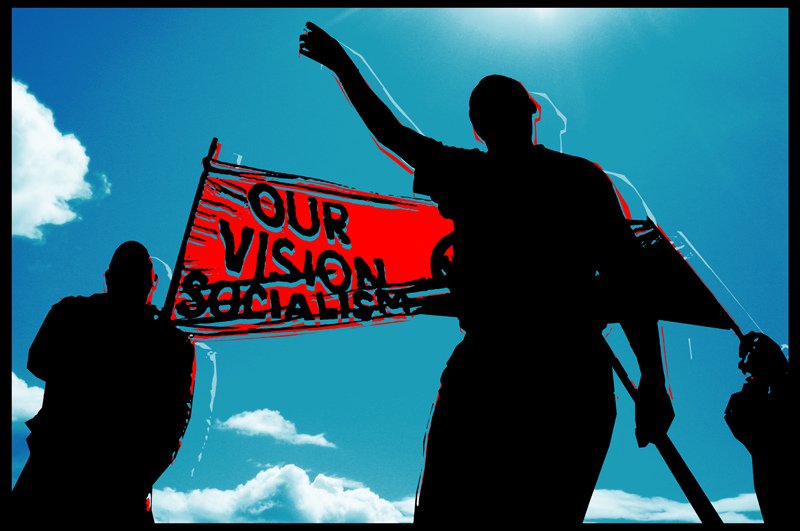Photo: Flickr/Jacob Anikulapo. CC BY-NC-SA 2.0.
The title of this post is derived from a well-known quotation by Mansoor Hekmat, the esteemed Iranian communist revolutionary.
If we consider genetic mutation or variation as biological awareness, and in this sense, the unconscious of humans, and on the other hand, consciousness as something acquired, biological awareness occurs accidentally, and consciousness is the result of deliberate human activity. What drives humans to establish social relations is the compulsion of production, in other words, an unconscious compulsion operates, but the organization of specific production relations is the result of practiced consciousness.
On preface to Critique of Political Economy, Marx wrote “It is not the consciousness of men that determines their being, but, on the contrary, their social being that determines their consciousness.” He also wrote German Ideology that “Both for the production of a communist consciousness on a massive scale and for the success of the goal itself, a wide-ranging change in people is necessary, a transformation that can only occur through a [human] practice: revolution.”
Therefore, the organization of social production, whether in the form of socialism, capitalism, or feudalism, is a conscious act. Consciousness does not precede human social existence, but as Marx emphasizes regarding communist consciousness, consciousness plays a role in establishing social relations.
The Great French Revolution is an example of human practice that led to an increase in people’s consciousness and caused a leap in social relations, changing humanity in non-biological, acquired ways. This revolution spread anti-religious, anti-feudal, and anti-monarchical consciousness at a general level. In addition, bourgeois and socialist consciousness spread to varying degrees, but capitalist consciousness prevailed over socialist consciousness because society was organized based on capitalist social relations. At the same level of bourgeois consciousness, respect for humanity in what is called civil society increased compared to previous social relations.
It is necessary to advance the level of abstraction in accordance with the level of abstraction in the subject being critiqued; otherwise, there is essentially no discussion, and it becomes a matter of comparing apples and oranges. The phrase “the essence of socialism is human” cannot be immediately explained, confirmed, or refuted by, for example, the abolition of the wage labor relationship in capitalist society, although socialism is concerned with both the abolition of wage labor and humanity at both levels of abstraction because the phrase “the essence…” is philosophical, not political.
In “The German Ideology,” Marx wrote that “In all revolutions up till now the mode of activity always remained unscathed and it was only a question of a different distribution of this activity, a new distribution of labour to other persons, whilst the communist revolution is directed against the preceding mode of activity, does away with labour, and abolishes the rule of all classes with the classes themselves, because it is carried through by the class which no longer counts as a class in society, is not recognised as a class, and is in itself the expression of the dissolution of all classes, nationalities, etc. within present society.”
In this brief, we see that the communist revolution cancels both the social production previously organized as “labor” and, by abolishing classes, nationalities, etc., it eliminates class, national, gender identities, and so on. Thus, what communism establishes is a human society. So, if we scrutinize the phrase “the essence of socialism is man” at the same level of abstraction it was raised, we arrive at social relations where man is the focus, not class, not labor, not exploitation, not nationality, not gender, not skin color, etc.
The phrase by Mansoor Hekmat: “The essence of socialism is man. Socialism is the movement to return agency to humans.” is directly derived from these sentences by Marx:
Communism as the positive transcendence of private property as human self-estrangement, and therefore as the real appropriation of the human essence by and for man; communism therefore as the complete return of man to himself as a social (i.e., human) being – a return accomplished consciously and embracing the entire wealth of previous development. This communism, as fully developed naturalism, equals humanism, and as fully developed humanism equals naturalism; it is the genuine resolution of the conflict between man and nature and between man and man – the true resolution of the strife between existence and essence, between objectification and self-confirmation, between freedom and necessity, between the individual and the species. Communism is the riddle of history solved, and it knows itself to be this solution.
Economic and Philosophic Manuscripts of 1844, chapter Private Property and Communism.


.
Support The Fire Next Time
I started this space with a simple but urgent goal: to speak freely and honestly about Iran—beyond the headlines, beyond the usual narratives. Inspired by James Baldwin’s The Fire Next Time, this blog is a place for difficult conversations, for challenging power, and for amplifying the struggles of those who are too often silenced.
Independent writing like this doesn’t have corporate backing or institutional support—it exists because of readers like you. If you believe in the importance of a space that pushes back against repression, that refuses to look away, and that insists on telling the truth, I invite you to support this work.
You can help sustain my work by becoming a member on Patreon:
Click here and choose an option
Your support not only helps keep this space alive but also ensures that these critical discussions remain accessible to all. Together, we can continue to challenge oppressive narratives, amplify marginalized voices, and work toward a more just world.






